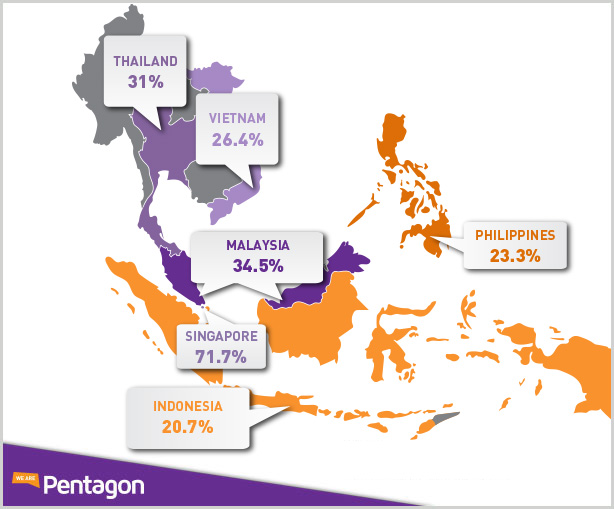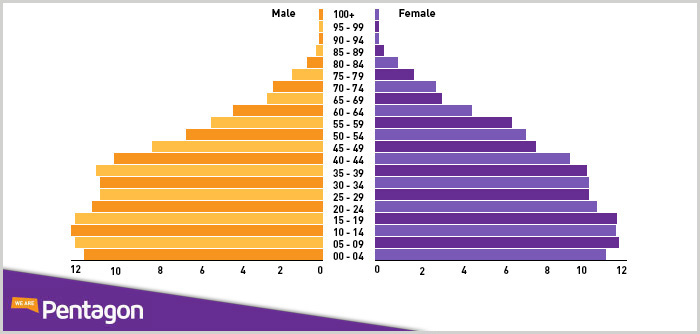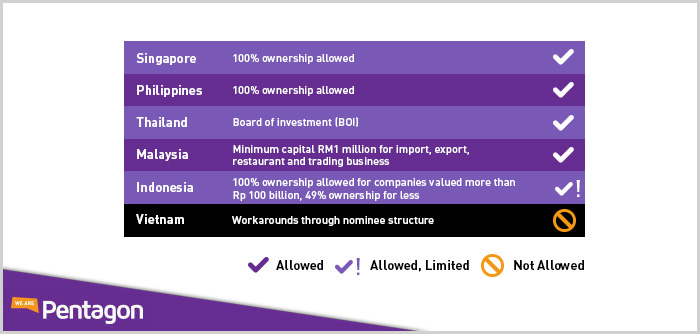The German group, Lazada, is aiming to become the Amazon of Southeast Asia; in other words, a complete ecommerce ecosystem. The group, backed by companies like J.P. Morgan Asset Managements, Tesco and Holtzbrinck, has already launched several marketplaces covering Thailand, Vietnam, Philippines, Indonesia, Singapore and Malaysia to serve an important and diversified group of customers, especially in rural areas. Lazada was recently purchased by the Alibaba Group following a successful billion-dollar acquisition, its biggest overseas investment yet to date.

[Internet Penetration in Southeast Asia by Country, in % of population, 2017 – Source: Wikipedia]
Why Lazada invested in Southeast Asia
The momentum towards ecommerce in the region is extremely promising due to a range of factors. Southeast Asia’s potential is unquestionable.
- A rising economy: the countries of the Association of Southeast Asian Nations (ASEAN – Brunei, Cambodia, Indonesia, Lao PDR, Malaysia, Myanmar, Philippines, Singapore, Thailand, Viet Nam) along with the other economies of Southeast Asia combine to form one of the world’s largest and most promising economies of recent years, according to The World Bank.
- The middle class is growing fast and by 2030 – according to the World Bank – the South and Southeast Asian nations will be home to more than one-quarter of the world’s working adults.
- A more stable economy: again according to The World Bank, the economy is becoming increasingly less vulnerable to external shocks; making the area more stable. Some local companies are already recognised as having levels of global excellence and innovation thanks to their technology and workforce training.
- Southeast Asia is increasingly open to foreign investments: some steps have already been made in order to encourage foreign investments (like the new Indonesian Presidential Regulation n. 44 of 2016) along with reforms that serve to connect these countries to the global chain of value. The changes in regulations are expected to serve as a strong foundation to level out the playing field, giving local companies more know-how and foreign players a chance to have a localised best practice.
- There is a very young population, and one million young people enter the workforce each month in Southeast Asia, with a growing urban population.

[Population of Indonesia by age and gender – 2017 – Source: globalpopulation.com]
Lazada marketplace operates in a less developed economy than those of the
USA or Europe, in that area each country has its own unique limitations. However, the marketplace has managed to overcome local obstacles and create a sustainable business. Today, the company aims to improve its logistics and distribution centres, especially in Malaysia where the company saw 80% sales growth in 2015.

[Foreign ownership regulation for ecommerce in Southeast Asia – Source: ecommerceiq.asia ]
Why sell on Lazada: a full range of opportunities
Lazada aims to empower their third-parties to sell and advertise their products to serve its customer base with efficiency and precision.
In rural Southeast Asian, there’s a significant opportunity for sellers as the availability of different items is limited even for everyday goods. The marketplace is currently trying to strengthen its assets using partnerships, maximising co-marketing efforts with international brands as well.
For this reason, Lazada offers a full range of services but also demands that vendors on the platform offer high-quality products and services themselves. The quality standards are enforced using rating systems and by checking products and services directly. A seller can take advantage of the following services on the marketplace, amongst others:
- An optional, fully-managed, end-to-end fulfilment service: items and orders can be processed and delivered by the Lazada team while the storage fee is waived
- Lazada updates its seller platform with plenty of data and tutorials about how to boost third-party sales
Quality and service requirements for sellers:
- All sellers are subjected to a seller rating that depends on lead time, cancellation rate and returns.
- The customer return policy allows the buyers to return purchased items within 7 calendar days with a money back guarantee. Returned items are subjected to a marketplace’s quality check.
- Lazada ensures to all its customers a Satisfaction Guarantee that upgrades buyer protection to the next level. Under this guarantee, customers can return items within 14 days for any reason, even if they just didn’t like an item.




